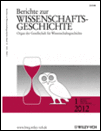
Berichte zur Wissenschaftsgeschichte
metrics 2024
Deciphering the Philosophical Threads of Scientific Progress
Introduction
Berichte zur Wissenschaftsgeschichte is a distinguished journal dedicated to the critical exploration of the history of science and its philosophical underpinnings, published by WILEY-V C H VERLAG GMBH in Germany. Since its inception in 1978, this authoritative journal has served as a vital resource for scholars, practitioners, and students alike, contributing to a deeper understanding of scientific developments across historical contexts. The journal holds a respectable Scopus rank in the arts and humanities, placing it in the 79th percentile among history publications and the 56th percentile in history and philosophy of science, marking it as an essential venue for impactful research. Berichte zur Wissenschaftsgeschichte encourages contributions that advance scholarly dialogue and foster an interdisciplinary approach, making it a pivotal platform for the exchange of ideas in the evolving discourse of science history. While it currently does not offer Open Access options, the journal's subscription model ensures that its curated content remains accessible to a global audience dedicated to the interdisciplinary analyses of science's past.
Metrics 2024
 0.12
0.12 0.60
0.60 0.50
0.50 10
10Metrics History
Rank 2024
Scopus
IF (Web Of Science)
JCI (Web Of Science)
Quartile History
Similar Journals
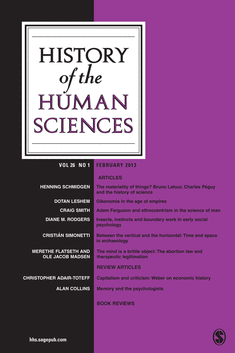
HISTORY OF THE HUMAN SCIENCES
Navigating the Complexities of Human ExperienceHISTORY OF THE HUMAN SCIENCES is a prestigious journal published by SAGE PUBLICATIONS LTD, dedicated to advancing the field of human sciences through multidisciplinary scholarship. With an ISSN of 0952-6951 and an E-ISSN of 1461-720X, this journal has been a cornerstone of research since its inception in 1988 and continues to address significant themes in history and philosophy of science. The journal boasts an impressive Q1 ranking in both History and History and Philosophy of Science categories as of 2023, underlining its impact and relevance in the academic community. Although not an open-access journal, it provides a wealth of scholarly articles that encourage critical dialogue and foster innovative thinking among researchers, professionals, and students alike. Located in the United Kingdom, the journal is committed to exploring the complexities of human experience and knowledge across varied contexts, making it an essential resource for anyone dedicated to understanding the historical dimensions of science and its philosophical implications.
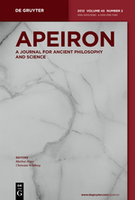
Apeiron-A Journal for Ancient Philosophy and Science
Advancing Understanding of Classical Ideas and ScienceApeiron - A Journal for Ancient Philosophy and Science is a distinguished academic journal published by Walter de Gruyter GmbH, based in Berlin, Germany. As an essential platform for scholars in the fields of History and Philosophy of Science and Philosophy, this journal holds a prestigious Q1 ranking in both domains as of 2023, reflecting its significant impact and contribution to these disciplines. With its ISSN 0003-6390 and E-ISSN 2156-7093, Apeiron aims to foster interdisciplinary dialogue by publishing original research, reviews, and critical essays that explore the rich intersections of ancient thought and scientific inquiry. As the journal converges into its fifth year from 2019 to 2024, it offers a vital resource for researchers, professionals, and students seeking to deepen their understanding of classical philosophical traditions and their relevance to contemporary science. Although it operates under a subscription model, the rigorous peer-review process ensures that each publication maintains the highest academic standards, thus solidifying Apeiron's status as a pivotal resource in its field.
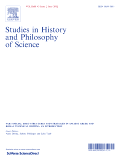
STUDIES IN HISTORY AND PHILOSOPHY OF SCIENCE
Unraveling the Philosophical Threads of Scientific EvolutionSTUDIES IN HISTORY AND PHILOSOPHY OF SCIENCE, published by Elsevier Science Ltd, is a leading academic journal dedicated to the exploration of historical and philosophical dimensions of science. With both an ISSN of 0039-3681 and E-ISSN of 1879-2510, this esteemed journal has established itself as a pivotal resource since its inception in 1970 and continues to publish cutting-edge research reflecting the evolution of scientific thought. Situated in the United Kingdom, it is recognized for its high-impact contributions, boasting a Q1 ranking in both History and History and Philosophy of Science categories as of 2023. Researchers in the humanities will benefit from the journal’s rigorous analysis and insightful discussions, as evidenced by its competitive Scopus rankings—placing it in the 96th and 83rd percentiles in their respective fields. Although not an open-access journal, it maintains a commitment to scholarly excellence, aiming to foster a deeper understanding of the interconnections between historical context and philosophical inquiry in the scientific domain, making it an invaluable resource for students, professionals, and researchers alike.

Dynamis
Advancing Scholarly Dialogue in Science and MedicineDynamis is a distinguished journal published by EDITORIAL UNIV GRANADA, focusing on the interdisciplinary fields of History and Philosophy of Science as well as Medicine. Since its inception in 1981, this journal has provided a platform for scholarly discussion and exploration of the evolution of scientific thought and medical practices, with a consistent commitment to enriching academic dialogue up to the year 2024. Operating within the Q4 category for both History and Philosophy of Science and Medicine in the 2023 rankings, it holds a unique niche despite its positioning and aims to amplify underrepresented voices and perspectives via rigorous academic analysis. Although not currently an open-access publication, Dynamis continues to serve as a vital resource for researchers, professionals, and students who are keen to understand the historical contexts and philosophical implications in these fields. Its impact within the academic community is reflected in its Scopus rankings, offering valuable insights into the interplay between history, philosophy, and medicine. Situated in beautiful Granada, Spain, Dynamis remains committed to fostering a deeper understanding of the sciences through a historical and philosophical lens.
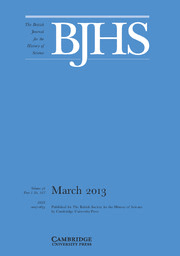
BRITISH JOURNAL FOR THE HISTORY OF SCIENCE
Advancing knowledge through the lens of historical inquiry.The British Journal for the History of Science is a premier academic publication dedicated to exploring the intricate relationship between science and society throughout history. Published by Cambridge University Press, this journal features a rich blend of original research articles, critical reviews, and scholarly discussions that illuminate the development of scientific ideas and practices from antiquity to the modern era. With a strong reputation reflected in its Q1 classification in History and Q2 in History and Philosophy of Science for 2023, this journal plays an essential role in advancing the field by engaging researchers, professionals, and students alike. The journal's commitment to intellectual rigor and cross-disciplinary dialogue fosters a deeper understanding of how scientific thought has shaped our world. Although it does not offer open access, the journal maintains a strong academic footprint, making significant contributions to historical scholarship. Join a community of scholars who are passionate about unfolding the rich tapestry of scientific history, as the British Journal for the History of Science continues to publish cutting-edge research until 2024.

Revista Colombiana de Filosofia de la Ciencia
Fostering Open Access to Philosophical InsightsRevista Colombiana de Filosofia de la Ciencia, published by UNIV EL BOSQUE, stands as a pivotal platform for the dissemination of knowledge in the field of philosophy of science. With a commitment to open access since 2010, this journal not only enhances the accessibility of crucial scholarly work but also encourages collaboration and dialogue among researchers, professionals, and students alike. Featuring an ISSN of 0124-4620 and an E-ISSN of 2463-1159, the journal fosters critical discussions on the implications and underpinnings of scientific thought, promoting an enriched understanding of how philosophical frameworks can shape scientific practices. The journal aims to bridge disciplines, inspiring new research pathways while contributing to the philosophical discourse surrounding science in Latin America and beyond. This dedication places the Revista Colombiana de Filosofia de la Ciencia as a leading voice in its field, making it an essential read for anyone looking to deepen their engagement with the philosophy that informs scientific investigation and theory.

CENTAURUS
Illuminating the Philosophical Dimensions of Scientific InquiryCENTAURUS is a prestigious journal dedicated to the History and Philosophy of Science, published by BREPOLS PUBL in the United States. With a storied history dating back to its inception in 1950, CENTAURUS has consistently provided a platform for critical engagement and scholarly discourse in the realm of scientific development and its philosophical implications. Recognized for its academic rigor, the journal holds a commendable Q2 ranking in the History and Philosophy of Science category for 2023, reflecting its substantial contribution to the field, as evidenced by its ranking in the top 11% of 223 journals in Scopus. Although it operates on a subscription-based model, the journal is a vital resource for researchers, professionals, and students seeking insightful analyses and discussions on the interplay between science and its philosophical dimensions. Published from Turnhout, Belgium, CENTAURUS continues to shape the landscape of scientific thought with its well-curated articles that examine over a decade's worth of scholarly contributions.

ARCHIVE FOR HISTORY OF EXACT SCIENCES
Charting the Historical Pathways of Exact SciencesARCHIVE FOR HISTORY OF EXACT SCIENCES, published by Springer, is an esteemed journal committed to promoting the understanding of the historical and philosophical dimensions of exact sciences, including mathematics and its application to various scientific fields. With a heritage dating back to 1964, this journal not only maintains a robust academic reputation in Germany but also reaches an international readership, reflected in its Scopus rankings, where it holds a commendable position in the 71st percentile for History and Philosophy of Science. The journal presently falls within Q3 and Q4 quartiles for its respective categories in 2023, highlighting its ongoing relevance and contribution to academia. As researchers, professionals, and students seek to explore the intricate relationships between mathematics, philosophy, and history, ARCHIVE FOR HISTORY OF EXACT SCIENCES serves as a key resource, fostering interdisciplinary dialogue and stimulating new inquiries in the complex landscape of science.
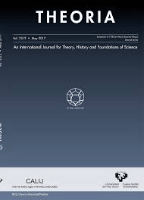
THEORIA-REVISTA DE TEORIA HISTORIA Y FUNDAMENTOS DE LA CIENCIA
Pioneering Insights in Philosophy and History of ScienceTHEORIA-REVISTA DE TEORIA HISTORIA Y FUNDAMENTOS DE LA CIENCIA, published by the Servicio Editorial Universidad del País Vasco, is a leading open access journal dedicated to advancing the fields of History, Philosophy of Science, and related disciplines since its inception in 2003. With a robust impact factor placing it in the esteemed Q1 and Q2 quartiles in its respective categories, this journal serves as a crucial platform for researchers, professionals, and students who are engaged in profound discussions and analyses of scientific foundations and historical contexts. Based in Spain, THEORIA has consistently demonstrated its commitment to scholarly excellence, achieving notable rankings in Scopus, particularly in the fields of Arts and Humanities, where it holds a rank of #169 in Philosophy and #59 in History and Philosophy of Science. The journal not only allows immediate open access to its diverse range of articles, fostering global knowledge dissemination, but also aims to bridge connections across varied philosophical inquiries and historical explorations within science. Join the dialogue today in shaping the future understanding of our scientific heritage.

Journal of Early Modern Studies-Romania
Charting the Cultural and Political Landscapes of Early Modern RomaniaThe Journal of Early Modern Studies-Romania serves as a vital platform for scholars and enthusiasts alike within the field of early modern studies. Published by ZETA BOOKS, this journal fosters a rich discourse on the cultural, political, and intellectual developments that shaped Romania and its connections to the broader European narrative during the early modern period. With an ISSN of 2285-6382 and an E-ISSN of 2286-0290, the journal is poised to contribute significantly to academic literature despite not currently being Open Access, facilitating access through academic institutions. The scope of the journal includes but is not limited to history, literature, art, and social studies, ensuring a multidisciplinary approach to early modern inquiry. Researchers, professionals, and students will find invaluable insights and innovative research avenues spotlighted in each issue, residing at the intersection of local and transnational early modern studies.